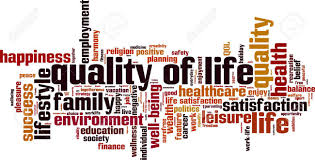What’s important to you in life? During a client call this week, we were discussing end of life planning and we explored the topic of “Quality of Life”. This topic may be interesting to consider while we are vibrantly healthy, as it is a glimpse into those little things that have meaning and importance to us.
Let’s take a look into the components of life that comprise overall quality of life.

By definition, “Quality of Life” is highly subjective. The Encyclopedia Britannica provides this explanation, “Quality of life, the degree to which an individual is healthy, comfortable, and able to participate in or enjoy life events. The term quality of life is inherently ambiguous, as it can refer both to the experience an individual has of his or her own life and to the living conditions in which individuals find themselves. Hence, quality of life is highly subjective. “
“Whereas one person may define quality of life according to wealth or satisfaction with life, another person may define it in terms of capabilities (e.g., having the ability to live a good life in terms of emotional and physical well-being). A disabled person may report a high quality of life, whereas a healthy person who recently lost a job may report a low quality of life. Within the arena of health care, quality of life is viewed as multidimensional, encompassing emotional, physical, material, and social well-being.”
The Health Care Component
The Office of Disease Prevention and Health Promotion goes into detail about health-related quality of life (HRQoL). A related topic is well-being – a topic near and dear to my heart! If you are interested in learning about the research underway this decade, read on to learn about “Healthy People 2020” studying HRQoL’s
and well-being to measure the effects of chronic illness, treatments, and short- and long-term disabilities.
https://www.healthypeople.gov/2020/about/foundation-health-measures/Health-Related-Quality-of-Life-and-Well-Being
The CDC also studies HRQoL’s.
https://www.cdc.gov/hrqol/concept.htm
As medical and public health advances have led to cures and better treatments of existing diseases and delayed mortality, it was logical that those who measure health outcomes would begin to assess the population’s health not only on the basis of saving lives, but also in terms of improving the quality of lives.
The quality of life goes deeper than financial resources and living standards. Think about the factors that influence what you value in living itself. Great conversation, music, food, smells, visual beauty, et al. What are the sounds, smells, sight and touch that bring comfort and care to you now?

Looking out for the little things throughout life helps us prepare for times when we might have difficulties conducting our day to day lives in ways we are accustomed. Whether it is listening to the birds chirp, smelling the scent of (fill in the blank!), reading (or listening to) a good book, watching your favorite sports team or feeling the sunshine – define what’s important in life to you and relay this information along to others early and often! Those who care for those they love want to provide care that includes how you define quality of life.
When you’re ready to investigate strategies to enhance your life and business planning, contact me via Email. Additional information is available upon request or on the website @ The Living Planner
#LifeAndBusinessIntersect #CareForPeopleCareForBusiness #StepUpStepIn
